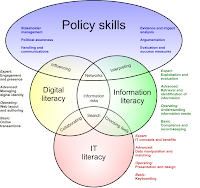Saturday, October 30, 2010
Response
Thursday, October 28, 2010
Part one of our book gives an overview of what 21st Century learning means. It traces the differences in how society has progressed in the value and content of education. The overreaching goals are the same, for example, “Contributing to work and society”. As society progresed from the Agrarian Age to the Industrial Age to the Knowledge Age we went from the basic need to grow our own food, to learning to apply engineering and science to grow food with less effort and to feed more people, to learning to work in partnership with nations from all over the world to produce food for a global market.
The needs of our world have changed and we must change with them. Gone are the days of a single lifelong occupation. The students of today will hold at least 11 jobs throughout their adult lives. Our students need the following skills and at this time they are not graduating from high school or college with these skills.
· Oral and written communications
· Critical thinking and problem solving
· Professionalism and work ethic
· Teamwork and collaboration
· Working in diverse teams
· Applying technology
· Leadership and project management
In order to accomplish the goal of the Knowledge Age we need to help our students embody these skills to be successful.
The authors have hit the nail on the head with the following quote.
“One of education’s chief roles is to prepare future workers and citizens to deal with the challenges of their times. Knowledge work—the kind of work that most people will need in the coming decades—can be done anywhere by anyone who has the expertise, a cell phone, a laptop, and an Internet connection. But to have expert knowledge workers, every country needs an education system that produces them; therefore, education becomes the key to economic survival in the 21st century.”
Sunday, October 24, 2010
Digital Lifestyle
 One of the concepts in my book, 21st Century Skills, is digital lifestyles. As I was combing through images trying to find something to represent this concept I ran across an image that took me beyond the classroom walls and into "life." The writing on the wall states " Make technology your servant. Your PC can make your shopping lists, give you recipes and keep you entertained at the same time. Imagine the possibilities!" What an idea! It made me think of a cartoon my children sometimes watch as I thought of how fast technology is changing our lifestyles. That cartoon was the "Jetsons" and they may not really be that far ahead of us. :)
One of the concepts in my book, 21st Century Skills, is digital lifestyles. As I was combing through images trying to find something to represent this concept I ran across an image that took me beyond the classroom walls and into "life." The writing on the wall states " Make technology your servant. Your PC can make your shopping lists, give you recipes and keep you entertained at the same time. Imagine the possibilities!" What an idea! It made me think of a cartoon my children sometimes watch as I thought of how fast technology is changing our lifestyles. That cartoon was the "Jetsons" and they may not really be that far ahead of us. :)
Friday, October 22, 2010
 Our future depends on what type of students we create.
Our future depends on what type of students we create. Thursday, October 21, 2010
Digital Literacy Skills

Wednesday, October 20, 2010
Miss Scandrett
Welcome to Literature Circle Thirteen!
Section One--Due October 28, Diane Durrin
Section Two--Due November 4, Shelly Inhofer
Section Three--Due November 11, Guyla Ness
Section Four--Due November 18,Lila Scandrett
Section Five--Due December 2, TBA
Section Six--Due December 9, TBA
